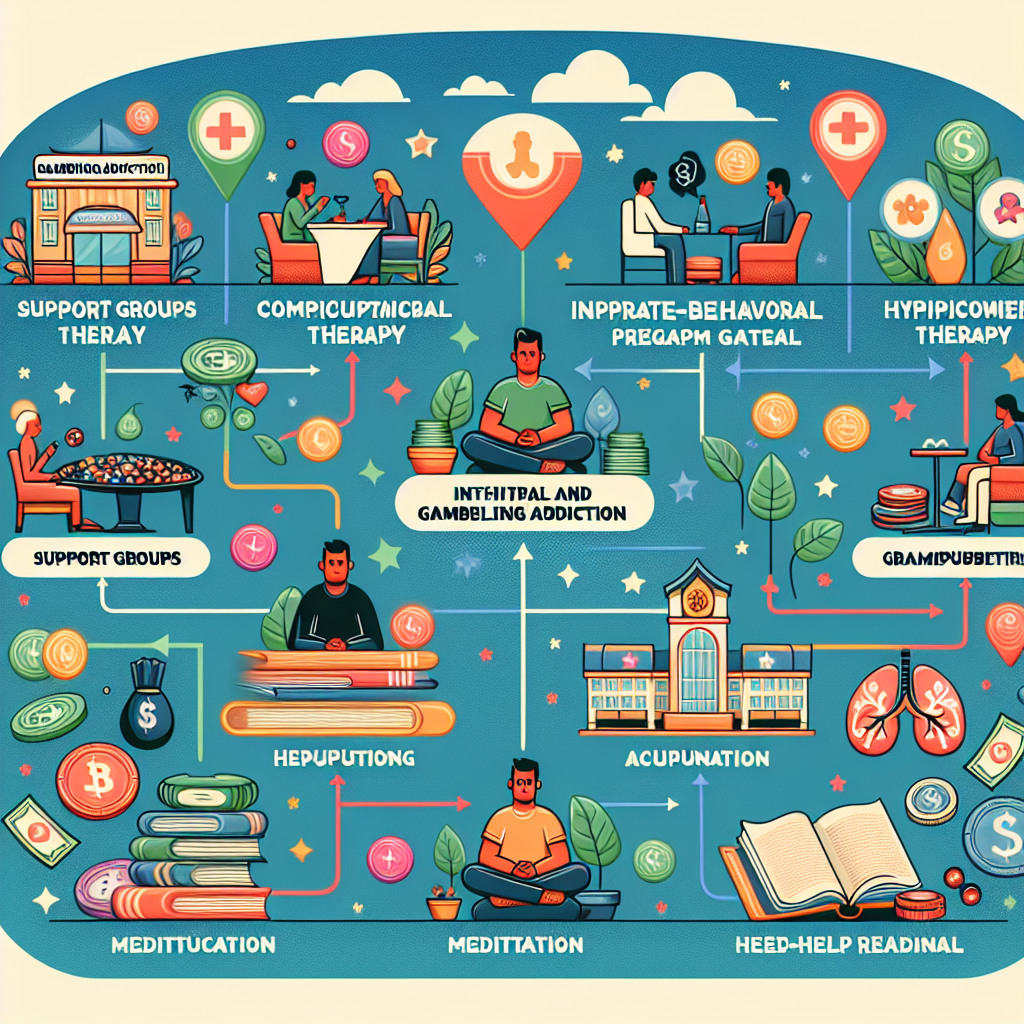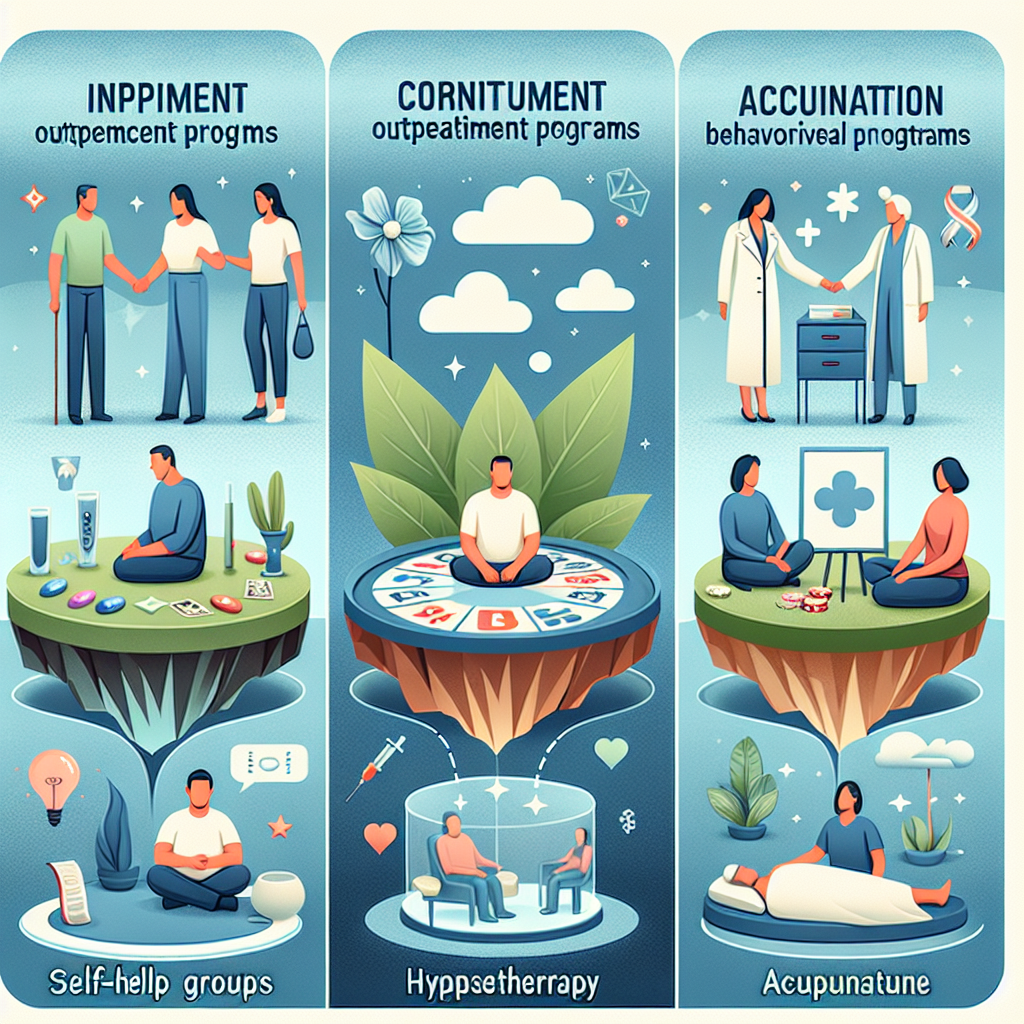-
Table of Contents

“Explore holistic therapies, support groups, and self-help strategies for overcoming gambling addiction.”
Introduction
Alternative treatments for gambling addiction, beyond traditional inpatient and outpatient programs, encompass a variety of approaches aimed at addressing the psychological, behavioral, and social aspects of the disorder. These treatments include cognitive-behavioral therapy (CBT), which helps individuals identify and change harmful thought patterns and behaviors associated with gambling. Support groups, such as Gamblers Anonymous, provide peer support and a structured program for recovery. Additionally, online therapy and telehealth services offer accessible options for those unable to attend in-person sessions. Mindfulness and stress reduction techniques, such as meditation and yoga, can also be beneficial in managing urges and reducing the emotional triggers that lead to gambling. Financial counseling and management services help individuals regain control over their finances and develop healthier spending habits. Lastly, pharmacological treatments, though less common, may be prescribed to address underlying mental health conditions that contribute to gambling behaviors. These diverse treatment options provide a comprehensive approach to overcoming gambling addiction, catering to the unique needs and circumstances of each individual.
Holistic Approaches to Gambling Addiction: Exploring Mindfulness, Meditation, and Yoga
Gambling addiction, a pervasive issue affecting millions worldwide, often necessitates professional intervention. While inpatient and outpatient programs are the traditional routes for treatment, there is a growing interest in holistic approaches that address the mind, body, and spirit. Among these, mindfulness, meditation, and yoga have emerged as powerful tools in the battle against gambling addiction, offering a complementary path to recovery that fosters inner peace and self-awareness.
Mindfulness, a practice rooted in ancient Buddhist traditions, involves paying deliberate attention to the present moment without judgment. For individuals struggling with gambling addiction, mindfulness can be transformative. By cultivating an awareness of their thoughts, emotions, and physical sensations, individuals can better understand the triggers that lead to compulsive gambling. This heightened awareness allows them to pause and reflect before acting on their impulses, thereby breaking the cycle of addiction. Moreover, mindfulness practices can reduce stress and anxiety, common co-occurring issues for those with gambling problems, by promoting a sense of calm and balance.
Transitioning from mindfulness to meditation, we find another potent tool in the holistic arsenal. Meditation, which often incorporates mindfulness techniques, involves focused attention and deep breathing exercises to achieve a state of mental clarity and emotional stability. Regular meditation practice can rewire the brain, enhancing areas responsible for self-control and decision-making. For someone grappling with gambling addiction, this can mean the difference between succumbing to the urge to gamble and choosing a healthier coping mechanism. Additionally, meditation fosters a deeper connection with oneself, encouraging introspection and self-compassion, which are crucial for long-term recovery.
Yoga, a practice that harmonizes the mind and body through physical postures, breath control, and meditation, offers a comprehensive approach to healing. The physical aspect of yoga helps release tension and stress stored in the body, which can be particularly beneficial for those who turn to gambling as a form of escapism. The mental discipline required in yoga practice enhances focus and concentration, skills that are transferable to resisting gambling urges. Furthermore, the spiritual component of yoga encourages a sense of purpose and connection to something greater than oneself, which can be incredibly motivating for individuals seeking to overcome addiction.
Incorporating these holistic practices into a recovery plan can provide a well-rounded approach to healing. For instance, starting the day with a mindfulness meditation session can set a positive tone, while a mid-day yoga practice can serve as a healthy outlet for stress. Evening reflections through meditation can help process the day’s events and reinforce a commitment to sobriety. These practices not only address the symptoms of addiction but also promote overall well-being, making them valuable additions to any recovery strategy.
While mindfulness, meditation, and yoga are not standalone cures for gambling addiction, they offer significant benefits when used alongside traditional treatments. They empower individuals to take an active role in their recovery, fostering resilience and self-efficacy. By integrating these holistic approaches, those struggling with gambling addiction can find a path to recovery that is not only effective but also enriching and transformative. The journey to overcoming addiction is undoubtedly challenging, but with the right tools and support, it is entirely possible to reclaim one’s life and embrace a future filled with hope and possibility.
The Role of Support Groups and Peer Counseling in Overcoming Gambling Addiction
Gambling addiction is a pervasive issue that affects millions of individuals worldwide, often leading to devastating financial, emotional, and social consequences. While inpatient and outpatient programs are commonly recommended for those struggling with this addiction, there are alternative treatments that can be equally effective. Among these, support groups and peer counseling play a crucial role in helping individuals overcome their gambling addiction, offering a sense of community, understanding, and shared experience that can be incredibly empowering.
Support groups, such as Gamblers Anonymous (GA), provide a structured environment where individuals can share their experiences, challenges, and successes with others who understand their struggles. These groups operate on the principle that mutual support and shared experiences can foster recovery. By attending regular meetings, individuals can gain insights into their own behaviors and learn coping strategies from others who have faced similar challenges. The sense of belonging and acceptance found in these groups can be a powerful motivator for change, helping individuals to stay committed to their recovery journey.
In addition to the emotional support provided, support groups often emphasize the importance of accountability. Members are encouraged to take responsibility for their actions and to set realistic goals for their recovery. This accountability can be a significant factor in maintaining long-term sobriety, as it helps individuals to stay focused and motivated. Furthermore, the group setting allows for the development of new social networks, which can be particularly beneficial for those who may have lost relationships due to their gambling behavior.
Peer counseling is another valuable resource for those seeking to overcome gambling addiction. Unlike traditional therapy, peer counseling involves individuals who have successfully navigated their own recovery journey offering guidance and support to others. This form of counseling is based on the belief that those who have experienced addiction firsthand are uniquely qualified to help others through the process. Peer counselors can provide practical advice, emotional support, and a sense of hope that recovery is possible.
One of the key benefits of peer counseling is the relatability factor. Individuals may feel more comfortable opening up to someone who has walked in their shoes, as opposed to a professional who may not have personal experience with addiction. This can lead to more honest and open communication, which is essential for effective recovery. Additionally, peer counselors can serve as role models, demonstrating that it is possible to overcome addiction and lead a fulfilling life.
Both support groups and peer counseling offer a sense of community that is often lacking in traditional treatment programs. This community aspect can be incredibly healing, as it helps individuals to feel less isolated and more understood. The shared experiences and mutual support found in these settings can foster a sense of hope and resilience, which are critical components of recovery.
Moreover, these alternative treatments can be more accessible and affordable than inpatient or outpatient programs. Many support groups are free to attend, and peer counseling services are often offered at a lower cost than traditional therapy. This accessibility can make a significant difference for individuals who may not have the financial resources to pursue more intensive treatment options.
In conclusion, while inpatient and outpatient programs are valuable resources for those struggling with gambling addiction, support groups and peer counseling offer unique benefits that can be equally effective. By providing a sense of community, accountability, and relatability, these alternative treatments can help individuals to overcome their addiction and build a healthier, more fulfilling life. The journey to recovery is challenging, but with the right support and resources, it is entirely possible.
Q&A
1. **Self-Help Groups**: Gamblers Anonymous (GA) is a 12-step program similar to Alcoholics Anonymous that provides peer support and a structured approach to overcoming gambling addiction.
2. **Cognitive Behavioral Therapy (CBT)**: This form of therapy helps individuals identify and change negative thought patterns and behaviors associated with gambling, often available through private therapists or online programs.
Conclusion
Alternative treatments for gambling addiction include self-help groups like Gamblers Anonymous, cognitive-behavioral therapy (CBT), online therapy programs, financial counseling, mindfulness and meditation practices, pharmacotherapy (medications), and family therapy. These options provide various levels of support and intervention, catering to different needs and preferences of individuals seeking help.



